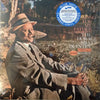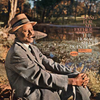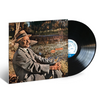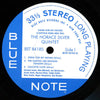









Horace Silver - Song For My Father
Piano – Horace Silver [click here to see more products featuring Horace Silver]
Tenor Saxophone – Joe Henderson (A1-2, B1-2) [click here to see more products featuring Joe Henderson]
Trumpet – Blue Mitchell (A3) [click here to see more products featuring Blue Mitchell]
Trumpet - Carmell Jones (A1-2, B1-2) [click here to see more products featuring Carmell Jones]
Tenor Saxophone – Junior Cook (A3, B3)
Bass – Gene Taylor (A3, B3), Teddy Smith (A1-2, B1-2)
Drums – Roger Humphries (A1-2, B1-2), Roy Brooks (A3, B3)
Written by Horace Silver (all tracks except B2), Joe Henderson (B2)
1 LP, Standard sleeve
Original analog Master tape : YES
Heavy Press : 180g
Record color : black
Speed : 33RPM
Size : 12”
Stereo
Studio
Record Press : Optimal
Label : Blue Note Classic Vinyl Series
Original Label : Blue Note
Recorded on October 31, 1963 & October 26, 1964 at Van Gelder Studio, Engelwood Cliffs, NJ
Recorded by Rudy Van Gelder
Produced by Alfred Lion
Mastered by Kevin Gray at Cohearent Audio
Design by Reid Miles
Liner Notes by Leonard Feather
Photography by Francis Wolff
Originally released in End of January 1965
Reissued in January 2021
Tracks :
Side A:
- Song For My Father
- The Natives Are Restless Tonight
- Calcutta Cutie
Side B:
- Que Pasa
- The Kicker
- Lonely Woman
Reviews :
“One of Blue Note's greatest mainstream hard bop dates, Song for My Father is Horace Silver's signature LP and the peak of a discography already studded with classics. Silver was always a master at balancing jumping rhythms with complex harmonies for a unique blend of earthiness and sophistication, and Song for My Father has perhaps the most sophisticated air of all his albums. Part of the reason is the faintly exotic tint that comes from Silver's flowering fascination with rhythms and modes from overseas -- the bossa nova beat of the classic "Song for My Father," for example, or the Eastern-flavored theme of "Calcutta Cutie," or the tropical-sounding rhythms of "Que Pasa?" Subtle touches like these alter Silver's core sound just enough to bring out its hidden class, which is why the album has become such a favorite source of upscale ambience. Song for My Father was actually far less focused in its origins than the typical Silver project; it dates from the period when Silver was disbanding his classic quintet and assembling a new group, and it features performances from both bands. Still, it hangs together remarkably well, and Silver's writing is at its tightest and catchiest. The title cut became Silver's best-known composition, partly because it provided the musical basis for jazz-rock group Steely Dan's biggest pop hit "Rikki Don't Lose That Number." Another hard bop standard is introduced here in the lone non-Silver tune, tenor saxophonist Joe Henderson's "The Kicker," covered often for the challenge of its stuttering phrases and intricate rhythms. Yet somehow it comes off as warm and inviting as the rest of the album, which is necessary for all jazz collections -- mainstream hard bop rarely comes as good as Song for My Father." Allmusic Review by Steve Huey.
Ratings:
AllMusic : 5 / 5 ; Discogs : 4.75 / 5 ; The Penguin Guide to Jazz : 4 / 4 ; The Rolling Stone Jazz Record Guide : 4 / 5 ; Encyclopedia of Popular Music : 5 / 5 ; DownBeat : 4 / 5


